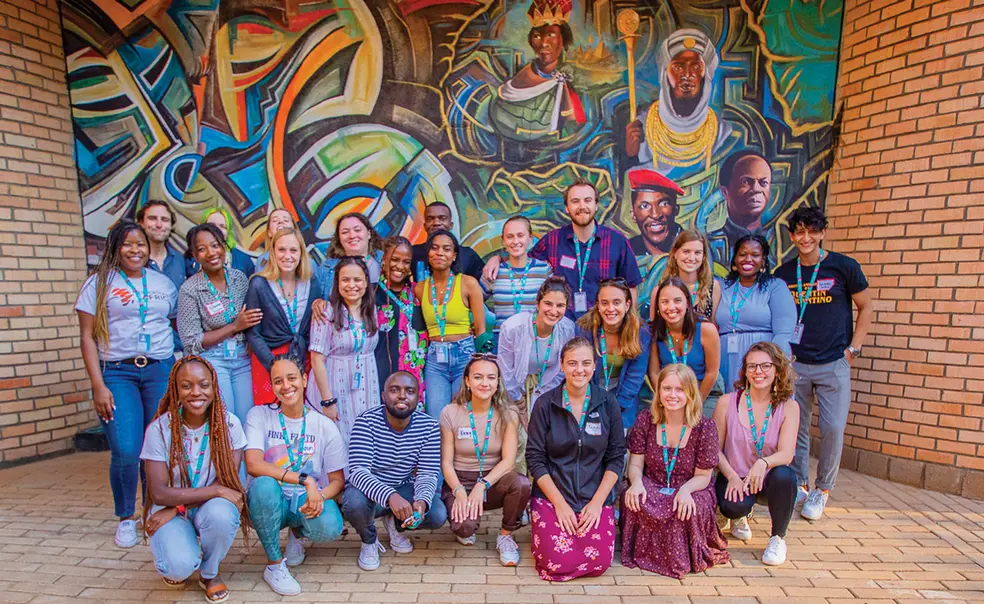Princeton in Africa Expands, Diversifies as It Turns 25
“The African continent has given so much to our fellows,” said PiAf executive director Damilola Akinyele
A week after graduating from Princeton, Brian White ’00 landed in the Democratic Republic of Congo to work for the International Rescue Committee (IRC). White was one of the five Princeton graduates who made up the first cohort of full-year Princeton in Africa (PiAf) fellows. In that debut 2000-01 year, the organization drew on only graduating Princeton students for the fellowship, sending the fellows to the Democratic Republic of Congo, Uganda, Somaliland, and Rwanda.
“There were four of us that went to work for IRC, and one of the other ones had the same thesis adviser as me,” White told PAW. “They were drawing from a small cohort of students who were particularly interested in this aspect of international affairs.”
A group of alumni, faculty, and staff with experience on the African continent founded PiAf in 1999 with the goal to build yearlong fellowships for graduates that partnered with diverse organizations across the continent. This would be the first Princeton fellowship program on the African continent, though Princeton in Asia had been in existence for 100 years.
The IRC in Rwanda was PiAf’s first partner, for a class of summer fellows in 1999. Twenty-five years later, PiAf has placed more than 700 fellows in 37 African countries with 113 partners — “nation changing organizations who are so deeply invested in their populations, in their country, living just and prosperous lives,” said PiAf executive director Damilola Akinyele. The scale of this network makes PiAf one of the most extensive and prestigious fellowships on the African continent.
“I’ve been in the development space for more than 12 years, so I see how a lot of organizations and a lot of countries do development. It’s always very top down, we know what’s best for you,” Akinyele said. “Princeton in Africa does a really good job of making sure that the fellows are very aware of development work: How do we decolonize development? Are you aware of your positionality and your power when you go to the African continent?”
In 2010, PiAf opened to applicants from any accredited U.S. institution. The Rev. Frank C. Strasburger ’67, one of PiAf’s founders, told PAW that the applicant pool quadrupled following this change.
Maggie Andresen studied journalism at Temple University before becoming a fellow in the 2017-18 class. She credits her “hands-on and practical-minded” training in Temple’s journalism program for preparing her for PiAf.
“The opportunity to apply that in this space was really unique and special in that Princeton in Africa didn’t see my background as not able to measure up to a more impressive kind of academic résumé — they saw it as a boon,” Andresen told PAW.
This year, PiAf is piloting its Nexus program, in which five fellows from U.S. institutions are paired with five fellows from institutions on the African continent.
“The African continent has given so much to our fellows,” Akinyele said. “Our fellows have contributed so much to the organizations that they work in. And we started to think about what those reciprocal and ethical partnerships with Africa look like.”
For this first year of Nexus, PiAf received applications from more than 80 African universities. Akinyele identifies Nexus as PiAf’s long-term commitment, with the hope that the paired U.S. and Africa fellow program will expand to be PiAf’s official model.
In 2022, Akinyele attended the U.S.-Africa Leaders Summit, hosted by President Joe Biden and attended by leaders from 49 African states, after which the United States committed to investing $55 billion in the continent over the next three years. She hopes that PiAf can have a place in that future.
“Princeton in Africa fellows are the future of U.S.-Africa relations, and they will do it really well,” Akinyele said.












No responses yet